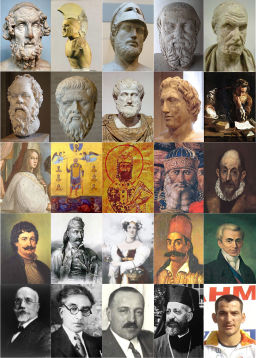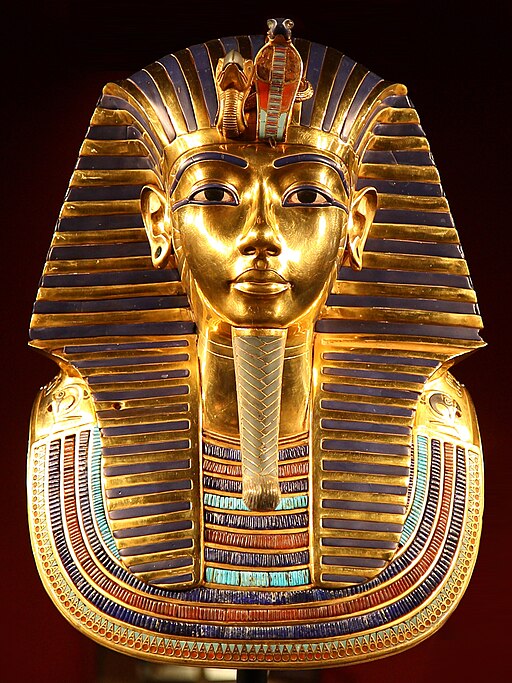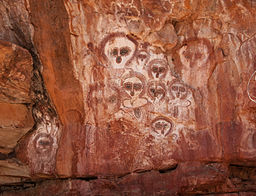
“A Dance to the Music of Time” by Nicolas Poussin is a painting whose exact meaning is not known. One interpretation is that the picture represents the passing of time and the different stages of life.
Its iconography depicts the revolving wheel of fortune: poverty, labor, wealth, and pleasure. Poussin’s paintings are based on a historical iconographic that was understood by his patrons of the 1600s.
Poverty is the male figure at the very back of the circle. He dances with his back turned towards the viewer, barefoot and of low status, looking towards Labor.
Labor is represented as a healthy young woman, dancing barefoot. Her bare shoulders and hair cover represent hard work. She is eagerly trying to grasp Wealth’s hand.
Wealth is a young woman with paler skin who dances with golden sandals and robe; she is reluctantly reaching out to Labor’s hand.
Pleasure is the young woman in blue who gazes at the viewer with a smirk and a flushing face.
An earlier interpretation was that the circle of figures symbolizes the Seasons Dance to the music played by Father Time on his lyre.
Autumn is here represented as Bacchus, the god of wine. The other seasons follow in turn as Winter, Spring, and Summer.
The two cherubs or cupids, one blowing bubbles and the other holding an hourglass allude to the transience of life.
The monument on the far left, consisting of a four-sided shaft tapering inward towards the bottom. It bears a double-headed bust, which depicts the youthful and mature Bacchus.
The scene is set in the early morning, with Aurora, goddess of dawn, preceding the chariot of Apollo, the sun-god in the sky. The Hours follow him as Apollo holds a ring representing the Zodiac.
As Poussin developed the painting, the theme appears to have transformed from the “Four Seasons Dance” into the concept of the “Cycle of Life and Fortune.”
This painting was created by a Roman patron who later became Pope Clement IX. The future Pope may have been influential in the changing of the theme.

An early pen and brown ink on a paper sketch by Nicolas Poussin shows how the painting was planned and has evolved. From the National Gallery of Scotland.
Nicolas Poussin
Nicolas Poussin (1594 – 1665) was the leading painter of the classical French Baroque style, although he spent most of his working life in Rome.
Most of his works were on religious and mythological subjects painted for a small group of Italian and French collectors.
He returned to Paris for a brief period to serve as First Painter to the King under Louis XIII and Cardinal Richelieu.
However, he soon returned to Rome and resumed his more traditional themes. He was a major inspiration for such classically oriented artists as Jacques-Louis David, Jean-Auguste-Dominique Ingres, and Paul Cézanne.
A Dance to the Music of Time
- Title: A Dance to the Music of Time
- Artist: Nicolas Poussin
- Year: 1634-1635
- Medium: Oil on canvas
- Dimensions: 82.5 cm × 104 cm (32.5 in × 41 in)
- Museum: Wallace Collection
Nicolas Poussin
- Name: Nicolas Poussin
- Born: 1594 – Les Andelys, Normandy, Kingdom of France
- Died: 1665 (aged 71) – Rome, Papal States (now Italy)
- Nationality: French
- Movement: Classicism, Baroque
- Notable works:
- The Crossing of the Red Sea
- A Dance to the Music of Time
- The Arcadian Shepherds
- The Four Seasons
- Spring or The Earthly Paradise
- Summer, or Ruth and Boaz
- Autumn or The Spies with the Grapes of the Promised Land
- Winter or Flood
- Moses Saved from the Waters
- “Achilles on Skyros” in Art
- Achilles on Skyros
- Discovery of Achilles on Skyros
Nicholas Poussin Dance to the Music of Time
Explore the Wallace Collection
- “The Laughing Cavalier” by Frans Hals
- “A Dance to the Music of Time” by Nicolas Poussin
- “Perseus and Andromeda” by Titian
- The Happy Accidents of the Swing by Jean-Honoré Fragonard
Poussin and Nature: Arcadian Visions
A Tour of London’s Museums and Heritage Sites
- The British Museum
- The National Gallery, London
- Tate Britain
- The Wallace Collection
- The Victoria and Albert Museum
- Queen’s Gallery, Buckingham Palace
- Courtauld Gallery
- Tate Modern, London
- Science Museum, London
- National Portrait Gallery, London
- Natural History Museum
- Charles Dickens Museum
- Hampton Court Palace
- Sherlock Holmes Museum
- British Library
- Imperial War Museum
- Churchill War Rooms
Nicolas Poussin (1594 – 1665) | 192 classic paintings
~~~
“There is no place for grief in a house which serves the Muse.”
– Sappho
~~~
Photo Credit: 1) Nicolas Poussin [Public domain], via Wikimedia Commons
Popular this Week








 Sponsor your Favorite Page
Sponsor your Favorite Page SEARCH Search for: Search Follow UsJoin – The JOM Membership Program
Sponsor a Masterpiece with YOUR NAME CHOICE for $5
Share this:
- Tweet
